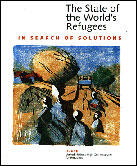Extract from "The State of the World's Refugees 1995 - In Search of Solutions" "The Right to Return", Chapter 2, (p. 61)
Extract from "The State of the World's Refugees 1995 - In Search of Solutions" "The Right to Return", Chapter 2, (p. 61)
-

Cover of 'The State of the World's Refugees 1995 – In Search of Solutions'
published by Oxford
University Press © 1995 UNHCR
The Right to Return
A further connection between human rights and the refugee problem is to be found in relation to the repatriation and reintegration of displaced populations. The right to return to one's own country is clearly stated in the Universal Declaration of Human Rights and is codified in the Covenant on Civil and Political Rights. 'No-one,' states the latter instrument, 'shall be arbitrarily deprived of the right to enter his own country.'
Refugees are most likely to exercise their right to repatriate voluntarily when they feel that their security can be assured, both during their journey home and once they have returned to their homeland. In recognition of this fact, in 1985, the governments which make up UNHCR's Executive Committee called for repatriation programmes 'to be carried out under conditions of absolute safety.'
In the period since that call was made, however, refugees have not always waited for such ideal conditions to be established before going back to their homes. Indeed, it is now quite common for mass repatriation movements to take place in countries which are still affected by armed conflict, where human rights violations continue to take place, and where the causes of the original exodus have not been fully resolved.
Refugees repatriate in such difficult circumstances for a variety of reasons. Sometimes, as in the case of Afghanistan, they decide to go home because an acceptable degree of peace and stability has returned to their own district or province, even though violent struggles for power are taking place in the capital city and other parts of the country. In other instances, as with the half a million Ethiopians who repatriated from Somalia in 1991-92, refugees go home because life has simply become too dangerous in their country of asylum.
In a third scenario, illustrated by the case of the Myanmar refugees in Bangladesh, refugees repatriate to countries where only limited changes have taken place because they cannot remain indefinitely in their country of asylum and because they have received assurances regarding their safety once they return to their homeland. As this example demonstrates, one of UNHCR's most important roles in the search for solutions is to negotiate such assurances with the governments concerned and to monitor their implementation.


